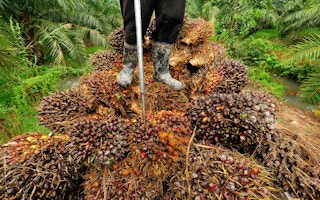Evasion of reporting commitments by members of the Roundtable on Sustainable Palm Oil (RSPO) is hindering progress towards making sustainable palm oil the norm, a report from World Wide Fund for Nature (WWF) and the Zoological Society of London has found.
To continue reading, subscribe to Eco‑Business.
There's something for everyone. We offer a range of subscription plans.
- Access our stories and receive our Insights Weekly newsletter with the free EB Member plan.
- Unlock unlimited access to our content and archive with EB Circle.
- Publish your content with EB Premium.
According to the report titled Committed to sustainable palm oil?, an analysis of RSPO members reporting on their Annual Communication of Progress (ACOP), reveals that one in five members failed to report their progress on becoming 100 per cent certified last year, while most companies are far from hitting their 2020 targets.
The RSPO, the leading certification for responsibly sourced palm oil, makes it mandatory for ordinary and affiliate members to report an ACOP every year to gauge their progress towards 100 per cent certified sustainable palm oil.
The report emerges as Selfridges, an upmarket department store chain in the United Kingdom, announced that it would remove palm oil from all its own products in a year, making it the second British retail company to make the move after Iceland supermarket committed to do the same last year.
Over a thousand consumer goods manufacturers, processors, traders, retailers and growers make up the RSPO membership, including major consumer brands such as PepsiCo and Nestlé.
However, in 2018, almost one in four RSPO member companies submitted incomplete or low-quality information in their ACOP reports, while 20 per cent did not even submit a report to the certification body, casting grave doubts over companies’ commitments to produce, trade and purchase sustainable palm oil.
The report also reveals that while several companies have pledged to source palm oil that is free of deforestation and exploitation by 2020, most of them are nowhere close to reaching their targets, while many others have set far less ambitious targets.
Less than a fifth of member companies have committed to producing or sourcing 100 per cent certified palm oil by 2020, while one fifth of consumer goods manufacturers that have a 2020 target have have not procured RSPO-certified palm oil.
“The ACOP is a really important tool for the RSPO to monitor companies’ progress on sustainable palm oil, and the RSPO needs to focus on the reasons behind why they aren’t submitting it,” Elizabeth Clarke, global palm oil lead at WWF Singapore told Eco-Business.
“It could be a simple reason like the right people are not getting the requests to submit. But it is alarming that even those that have submitted are not making progress at all. That there are laggard, sleeping members who are sitting in the RSPO but aren’t making any difference is extremely worrying.”
Clarke added that the RSPO needs to relook the kinds of questions included in the ACOP: “How do we keep it simple and on point to what we need to know?”
“
That there are laggard, sleeping members who are sitting in the RSPO but aren’t making any difference is extremely worrying.
Elizabeth Clarke, global palm oil lead, World Wide Fund for Nature
Lack of transparency is a persistent issue in the palm oil industry, where cases of deforestation, land conflicts and labour issues get lost in complex supply chains. According to the report, without better transparency, civil society, buyers, financiers, and other stakeholders are prevented from accurately assessing the progress of palm oil companies in improving sustainability.
In 2018, the RSPO suspended 45 companies and kicked out another four for their failure to submit their ACOPs. RSPO obligations hold that members are suspended if they do not report to the RSPO for two consecutive years and terminated after three.
Food and beverage giant Nestlé was suspended by the RSPO last year for failing to submit its sustainability report in 2016 and submitting an incomplete one the year after.
The report calls on the RSPO to “tighten and enforce requirements for companies to regularly report accurate information in their ACOPs.”








